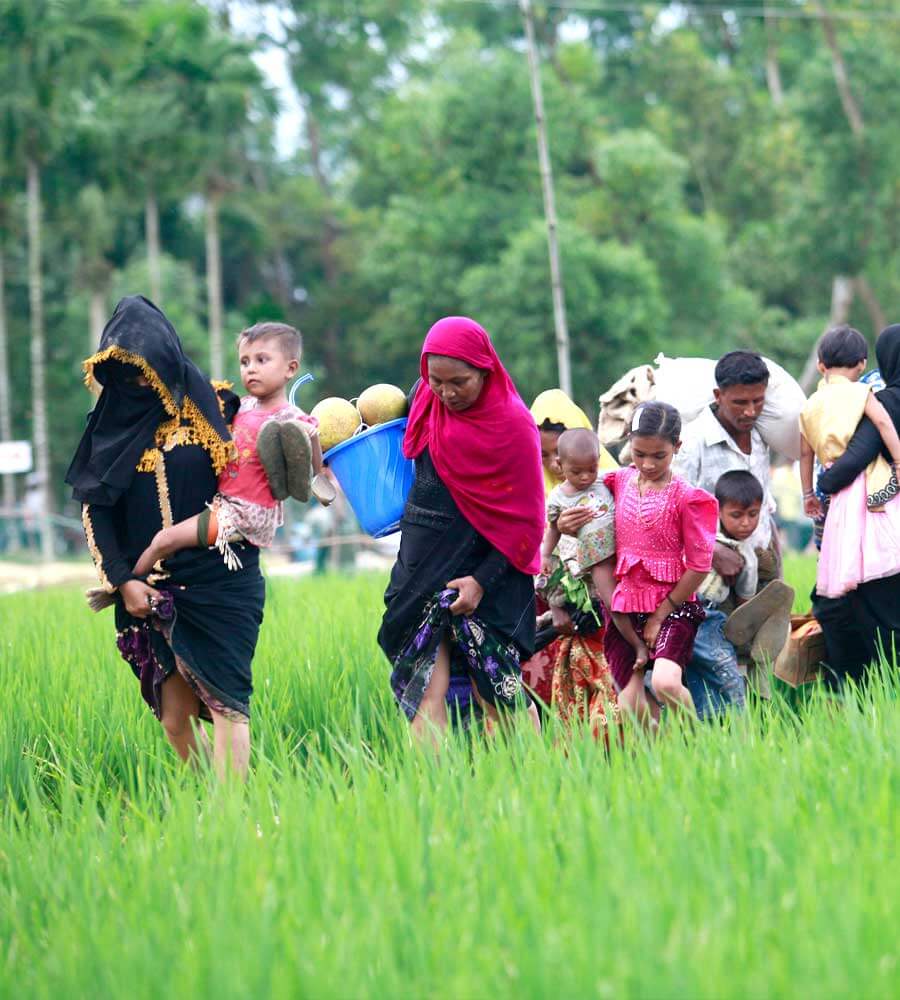Our work with Burma
Amid bombs and blockades, resilient grassroots networks are providing hope
Burma is at a crossroads of unspeakable crisis and unyielding hope. From the ongoing genocide of the Rohingya to the military junta’s brutal coup in February 2021, the people of Burma have endured a relentless campaign of brutal violence.
Image: Rohingya Muslims, who crossed over from Burma into Bangladesh, walk to take shelter at Balukhali refugee camp

A state of civil war
The junta’s attacks extend far beyond political repression, including mass killing, destruction of homes, and forced displacement. They continue to use weaponry, including fighter jets and drones, to systematically strike and bomb schools, hospitals, and entire villages.
Despite peaceful pro-democracy protests being met with deadly force, grassroots leaders and civil society networks continue to courageously speak out. Where the junta destroys, these groups build. Where the junta neglects, they nurture. UUSC and our partners refuse to abandon Burma during its darkest hours as we continue to advocate for an inclusive and peaceful future.
The history
Since 1995, UUSC has collaborated with partners to document and publicize human rights violations, aiming to raise awareness for one of the world’s longest-running civil wars among international communities. Burma is home to 135 official ethnic groups, many of whom have endured war crimes and crimes against humanity in the pursuit of democratic rights and dignity. Our early support focused on advancing women’s leadership and grassroots mobilization among refugee populations at the Thai-Burma border.
From the mid-2000s, when the international community’s access to the country was severely restricted by the military junta, UUSC expanded its support to include assistance for communities facing natural disasters, including our humanitarian aid response to the devastating 2008 Cyclone Nargis. Despite the potential for positive change from the 2012 democratic reforms, the military junta continued to interfere with elections and exert power through violence and political corruption. In 2017, the United Nations found that the junta’s campaign against the Rohingya was an act of genocide.
In May 2023, Cyclone Mocha devastated Burma’s west coast, killing over 400 people and displacing thousands as Rohingya communities were trapped in barbed-wire camps. Our partners responded with emergency aid while documenting the roots of the disaster in systemic oppression. That same year, UUSC joined 149 organizations in a global campaign to cut off jet fuel to the junta’s air force, pushing for sanctions and embargoes to halt aerial attacks on civilians. Most recently, following the March 2025 earthquake in central Burma, we mobilized advocacy and relief through trusted local networks, ensuring that support reached survivors, even in areas the junta had tried to isolate.
Justice grows from the ground up
UUSC’s partnerships drive grassroots solutions in Burma’s most heavily impacted regions, where the government has left communities to fend for themselves with limited resources.
- The Coordination Team for Emergency Relief (CTER) delivers lifesaving aid along the Thai-Burma border, providing food and shelter assistance to those in need.
- In eastern Burma, the Karen Peace Support Network (KPSN) supports trauma healing, education, and community-led rebuilding in areas scarred by war.
- The Burmese Rohingya Organization UK (BROUK) connects immediate disaster relief with long-term human rights advocacy, documenting genocide and producing research reports.
These partners do what the junta will not: care, protect, and sustain. A better future for Burma is possible, thanks to the dedication and courage of the Burmese people, whom we are proud to support.
Support community-led response
Your gift delivers vital resources directly to grassroots organizations leading the way through a crisis — providing care, protecting rights, and organizing for long-term change.